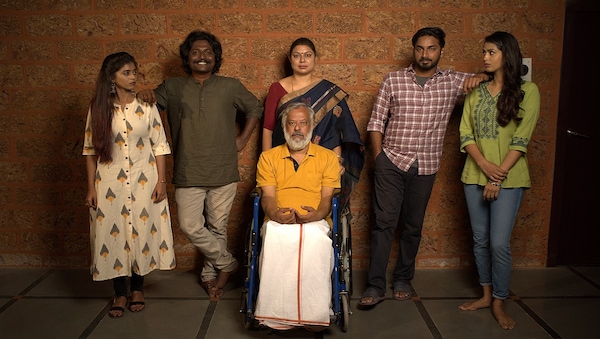Family Drama review: Suhas leaves you spellbound in this gem of a crime drama
Director Meher Tej makes a spectacular debut with an absorbing film that also works as a dark satire on the family drama genre

Last Updated: 09.20 PM, Oct 28, 2021
Story:
Sadashiva Rao is an autocratic, abusive father, who makes life hell for his sons Rama and Lakshman since childhood and doesn't spare his vulnerable wife Parvathi at his house either. It's an ordeal for the three to survive in the house amidst his presence. One day, the father throws Ram out of his house, who's left to fend for himself. The traumatic childhood leaves him bitter and paves the way for his transformation into a psychopath. Lakshman's struggles to get a job irks his father, who threatens to show the door to his son and his wife Yamini if he doesn't progress in life. Where are these lives headed?
Review:
Are psychopaths naturally evil? Do they commit crimes as a last resort? Has parenting or the reckless ways of society got to do anything with it? Does it run within genes or is there more to it? Family Drama, rightly, doesn't attempt to connect the dots but leaves you dumbfounded with its spectacular, edge-of-the-seat (or shall we say couch?) narrative, that's unlike anything that Telugu cinema has witnessed in recent years. The crime drama is one little gem that works as a brutal satire on the 'family drama' genre and is a telling exploration of the unpredictability of human behaviour.
The film is predominantly set in a seemingly normal-looking household where an obnoxious elderly man wreaks havoc on his wife and son. The man has a redoubtable reputation at work though he transforms into a beast back home. The mother remains the silent victim who can't do much beyond cursing her fate. Their elder son, Rama, is a bitter psychopath with a fascination for classical music. The younger one, Lakshman, a jobless youngster, is inching to take charge of his life. There's more to them than what meets the eye. All hell breaks loose when a wicked plot is hatched to end their misery.
Human manipulation is at the core of the plot. How would one react if their tolerance levels are pushed to the brink? The filmmaker sets up his ambience smartly, writes fascinatingly flawed characters that drive the story. The twists land at the right occasions, the intensity in the storytelling isn't compromised, no matter what. The gore creates the intended shock value but isn't repulsive. The crisp screenplay, the changing nature of interpersonal relationships over the course of the film, keeps you on your toes. Beyond all the smartness, there's simplicity, clarity in the storytelling.
Rama, the best-written character in the film, is not your conventional psychopath. He's stylish, but there's a spiritual side to him. His day begins with a Sai Baba bhajan, while classical music eases his nerves during tense situations. He's perpetually in a conversation with himself, dances like no one's watching. His evil smile gives you the creeps. There's still something very calm about him despite his notoriousness. Suhas brings the quirks of this multilayered character alive like a seasoned veteran and is bursting with hunger and enthusiasm to prove himself.
It's hard to pin down the film under one genre. Beyond the crime aspect, it's partly a psychological thriller, while at times, it functions brilliantly as a dark comedy and also has shades of a home invasion thriller leading to the climax. The casting of unknown faces, like Sanjay Ratha, Pooja Kiran, Anusha Nuthula, Teja Kasarapu and Shruti, works to the film's advantage and keeps you constantly guessing about the trajectory of their characters. The earnest performances and the crew's terrific command over their craft add up to the impact.
In particular, it's the composers Ajay and Sanjay, who are brilliant with their experiments. The usage of classical and devotional music in the unlikeliest of situations leaves you awestruck. Be it Naanaati Bratuku Natakamu or the Sai Baba arati or the gamakas in Maha Ganapatim to elevate the tension in the pre-climax sequence, their ideas are wacky, original and at the same time, effective. The cinematographer Venkat R Shakamuri conveys the intent of the sequences with delightful minimalism.
The film is a perfect choice for an OTT release - it delves into a hitherto unexplored terrain in Indian cinema and makes up for the absence of familiar faces with a compelling plot. The screenplay, by Meher Tej and Shanmukha Prashant, is refreshing and never lets the bitterness in the plot get to you. The climax ends on a shocking note and leaves you with a few loose ends that could lay a foundation for an equally engaging sequel. The interestingly titled film is exactly an antithesis to what you expect from the 'family drama' genre. (Would Nanati Bratuku Natakamu have worked as a good title too?)
Verdict:
Family Drama makes for a nail-biting viewing experience, despite working around a shoestring budget and limited locations. The film proves you don't always need larger-than-life stars, Mumbai imports, fancy budgets to keep a viewer engaged for a couple of hours. Suhas is the show-stealer, but full marks to the director Meher Tej for his precision and narrative control in his very first film. Don't miss this!
Subscribe to our newsletter for top content, delivered fast.
